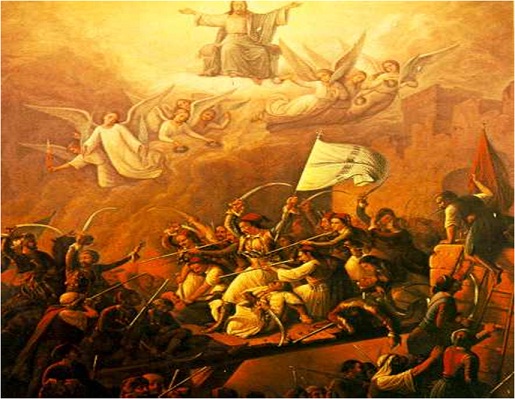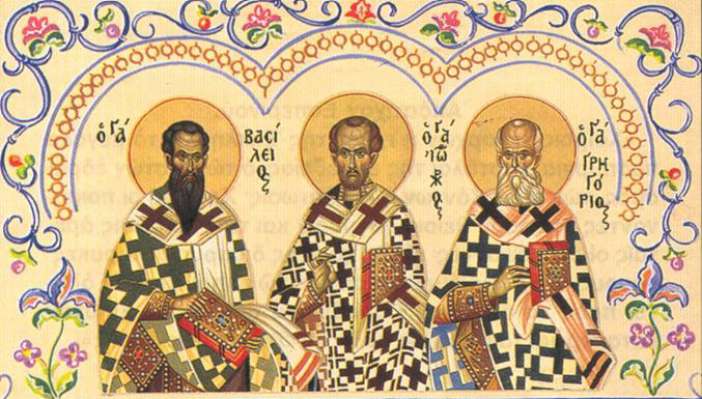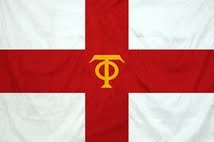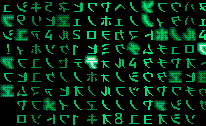Ευαγγελισμός της Θεοτόκου
“…διότι ἀφῄρηται ὁ ζυγὸς ὁ ἐπ᾿ αὐτῶν κείμενος καὶ ἡ ῥάβδος ἡ ἐπὶ τοῦ τραχήλου αὐτῶν· τὴν γὰρ ῥάβδον τῶν ἀπαιτούντων διεσκέδασε Κύριος, ὡς τῇ ἡμέρᾳ τῇ ἐπὶ Μαδιάμ.
ὅτι πᾶσαν στολὴν ἐπισυνηγμένην δόλῳ καὶ ἱμάτιον μετὰ καταλλαγῆς ἀποτίσουσι καὶ θελήσουσιν εἰ ἐγενήθησαν πυρίκαυστοι.
ὅτι παιδίον ἐγενήθη ἡμῖν, υἱὸς καὶ ἐδόθη ἡμῖν, οὗ ἡ ἀρχὴ ἐγενήθη ἐπὶ τοῦ ὤμου αὐτοῦ, καὶ καλεῖται τὸ ὄνομα αὐτοῦ μεγάλης βουλῆς ἄγγελός, θαυμαστὸς σύμβουλος, Θεὸς ἰσχυρός, ἐξουσιαστής, ἄρχων εἰρήνης, πατὴρ τοῦ μέλλοντος αἰῶνος· ἐγὼ γὰρ ἄξω εἰρήνην ἐπὶ τοὺς ἄρχοντας, εἰρήνην καὶ ὑγίειαν αὐτῷ…” (Ησαίας 9,4)
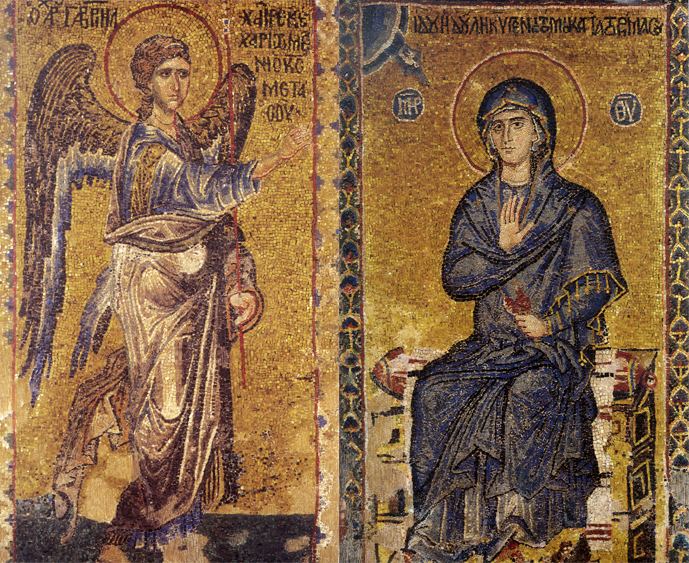
Η δική μας “αναγέννηση”
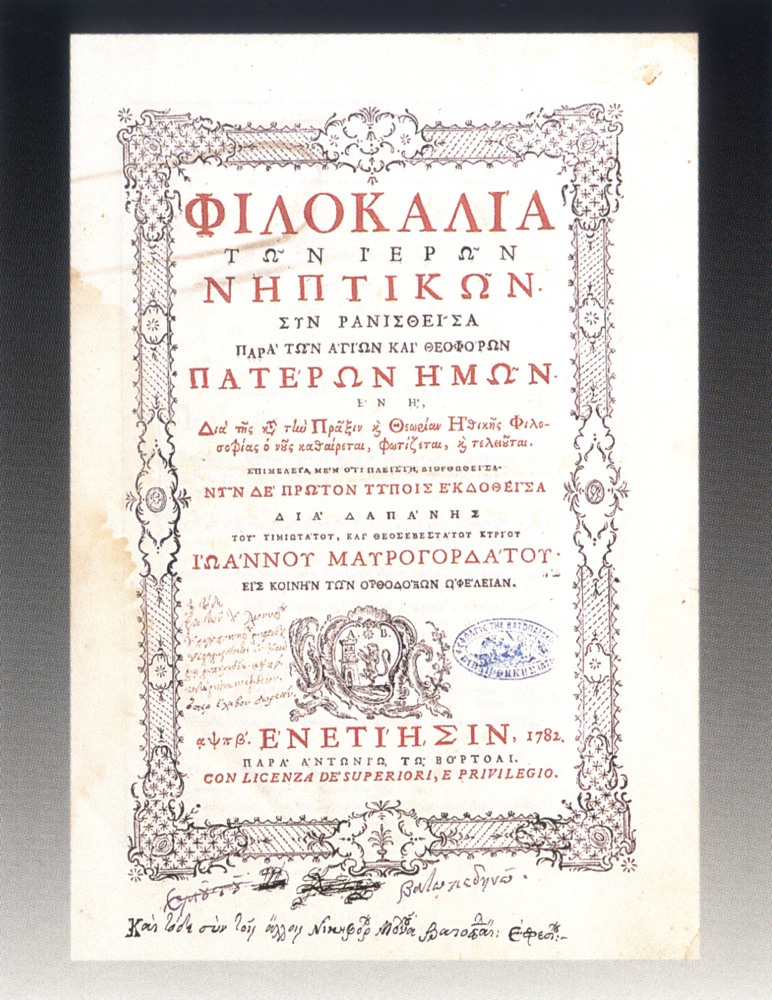 Εμείς σε αντίθεση με τη δύση έχουμε τη δική μας “αναγέννηση”. Είμαστε όλοι τέκνα της Φιλοκαλικής Αναγέννησης!… (Η “Φιλοκαλία” ΕΔΩ)
Εμείς σε αντίθεση με τη δύση έχουμε τη δική μας “αναγέννηση”. Είμαστε όλοι τέκνα της Φιλοκαλικής Αναγέννησης!… (Η “Φιλοκαλία” ΕΔΩ)
Κατα την τάξη Μελχισεδέκ
 1 Οὗτος γὰρ ὁ Μελχισεδέκ, βασιλεὺς Σαλήμ, ἱερεὺς τοῦ Θεοῦ τοῦ ὑψίστου, ὁ συναντήσας ᾿Αβραὰμ ὑποστρέφοντι ἀπὸ τῆς κοπῆς τῶν βασιλέων καὶ εὐλογήσας αὐτόν,
1 Οὗτος γὰρ ὁ Μελχισεδέκ, βασιλεὺς Σαλήμ, ἱερεὺς τοῦ Θεοῦ τοῦ ὑψίστου, ὁ συναντήσας ᾿Αβραὰμ ὑποστρέφοντι ἀπὸ τῆς κοπῆς τῶν βασιλέων καὶ εὐλογήσας αὐτόν,
2 ᾧ καὶ δεκάτην ἀπὸ πάντων ἐμέρισεν ᾿Αβραάμ, πρῶτον μὲν ἑρμηνευόμενος βασιλεὺς δικαιοσύνης, ἔπειτα δὲ καὶ βασιλεὺς Σαλήμ, ὅ ἐστι βασιλεὺς εἰρήνης,
3 ἀπάτωρ, ἀμήτωρ, ἀγενεαλόγητος, μήτε ἀρχὴν ἡμερῶν μήτε ζωῆς τέλος ἔχων, ἀφωμοιωμένος δὲ τῷ υἱῷ τοῦ Θεοῦ, μένει ἱερεὺς εἰς τὸ διηνεκές.
4 Θεωρεῖτε δὲ πηλίκος οὗτος, ᾧ καὶ δεκάτην ᾿Αβραὰμ ἔδωκεν ἐκ τῶν ἀκροθινίων ὁ πατριάρχης.
5 καὶ οἱ μὲν ἐκ τῶν υἱῶν Λευῒ τὴν ἱερατείαν λαμβάνοντες ἐντολὴν ἔχουσιν ἀποδεκατοῦν τὸν λαὸν κατὰ τὸν νόμον, τοῦτ’ ἔστι τοὺς ἀδελφοὺς αὐτῶν, καίπερ ἐξεληλυθότας ἐκ τῆς ὀσφύος ᾿Αβραάμ·
6 ὁ δὲ μὴ γενεαλογούμενος ἐξ αὐτῶν δεδεκάτωκε τὸν ᾿Αβραάμ, καὶ τὸν ἔχοντα τὰς ἐπαγγελίας εὐλόγηκε.
7 χωρὶς δὲ πάσης ἀντιλογίας τὸ ἔλαττον ὑπὸ τοῦ κρείττονος εὐλογεῖται.
8 καὶ ὧδε μὲν δεκάτας ἀποθνήσκοντες ἄνθρωποι λαμβάνουσιν, ἐκεῖ δὲ μαρτυρούμενος ὅτι ζῇ.
9 καὶ ὡς ἔπος εἰπεῖν, διὰ ᾿Αβραὰμ καὶ Λευῒ ὁ δεκάτας λαμβάνων δεδεκάτωται·
10 ἔτι γὰρ ἐν τῇ ὀσφύϊ τοῦ πατρὸς ἦν ὅτε συνήντησεν αὐτῷ ὁ Μελχισεδέκ.
11 Εἰ μὲν οὖν τελείωσις διὰ τῆς Λευϊτικῆς ἱερωσύνης ἦν· ὁ λαὸς γὰρ ἐπ’ αὐτῇ νενομοθέτητο· τίς ἔτι χρεία κατὰ τὴν τάξιν Μελχισεδὲκ ἕτερον ἀνίστασθαι ἱερέα καὶ οὐ κατὰ τὴν τάξιν ᾿Ααρὼν λέγεσθαι;
12 μετατιθεμένης γὰρ τῆς ἱερωσύνης ἐξ ἀνάγκης καὶ νόμου μετάθεσις γίνεται.
13 ἐφ’ ὃν γὰρ λέγεται ταῦτα, φυλῆς ἑτέρας μετέσχηκεν, ἀφ’ ἧς οὐδεὶς προσέσχηκε τῷ θυσιαστηρίῳ.
14 πρόδηλον γὰρ ὅτι ἐξ ᾿Ιούδα ἀνατέταλκεν ὁ Κύριος ἡμῶν, εἰς ἣν φυλὴν οὐδὲν περὶ ἱερωσύνης Μωϋσῆς ἐλάλησε.
15 Καὶ περισσότερον ἔτι κατάδηλόν ἐστιν, εἰ κατὰ τὴν ὁμοιότητα Μελχισεδὲκ ἀνίσταται ἱερεὺς ἕτερος,
16 ὃς οὐ κατὰ νόμον ἐντολῆς σαρκικῆς γέγονεν, ἀλλὰ κατὰ δύναμιν ζωῆς ἀκαταλύτου·
17 μαρτυρεῖ γὰρ ὅτι σὺ ἱερεὺς εἰς τὸν αἰῶνα κατὰ τὴν τάξιν Μελχισεδέκ.
18 ἀθέτησις μὲν γὰρ γίνεται προαγούσης ἐντολῆς διὰ τὸ αὐτῆς ἀσθενὲς καὶ ἀνωφελές·
19 οὐδὲν γὰρ ἐτελείωσεν ὁ νόμος, ἐπεισαγωγὴ δὲ κρείττονος ἐλπίδος, δι’ ἧς ἐγγίζομεν τῷ Θεῷ.
20 καὶ καθ’ ὅσον οὐ χωρὶς ὁρκωμοσίας· οἱ μὲν γὰρ χωρὶς ὁρκωμοσίας εἰσὶν ἱερεῖς γεγονότες,
21 ὁ δὲ μετὰ ὁρκωμοσίας διὰ τοῦ λέγοντος πρὸς αὐτόν· ὤμοσε Κύριος, καὶ οὐ μεταμεληθήσεται· σὺ ἱερεὺς εἰς τὸν αἰῶνα κατὰ τὴν τάξιν Μελχισεδέκ· 22 κατὰ τοσοῦτον κρείττονος διαθήκης γέγονεν ἔγγυος ᾿Ιησοῦς.
23 Καὶ οἱ μὲν πλείονές εἰσι γεγονότες ἱερεῖς διὰ τὸ θανάτῳ κωλύεσθαι παραμένειν·
24 ὁ δὲ διὰ τὸ μένειν αὐτὸν εἰς τὸν αἰῶνα ἀπαράβατον ἔχει τὴν ἱερωσύνην·
25 ὅθεν καὶ σῴζειν εἰς τὸ παντελὲς δύναται τοὺς προσερχομένους δι’ αὐτοῦ τῷ Θεῷ, πάντοτε ζῶν εἰς τὸ ἐντυγχάνειν ὑπὲρ αὐτῶν.
26 Τοιοῦτος γὰρ ἡμῖν ἔπρεπεν ἀρχιερεύς, ὅσιος, ἄκακος, ἀμίαντος, κεχωρισμένος ἀπὸ τῶν ἁμαρτωλῶν καὶ ὑψηλότερος τῶν οὐρανῶν γενόμενος,
27 ὃς οὐκ ἔχει καθ’ ἡμέραν ἀνάγκην, ὥσπερ οἱ ἀρχιερεῖς, πρότερον ὑπὲρ τῶν ἰδίων ἁμαρτιῶν θυσίας ἀναφέρειν, ἔπειτα τῶν τοῦ λαοῦ· τοῦτο γὰρ ἐποίησεν ἐφάπαξ ἑαυτὸν ἀνενέγκας.
28 ὁ νόμος γὰρ ἀνθρώπους καθίστησιν ἀρχιερεῖς ἔχοντας ἀσθένειαν, ὁ λόγος δὲ τῆς ὁρκωμοσίας τῆς μετὰ τὸν νόμον υἱὸν εἰς τὸν αἰῶνα τετελειωμένον.
Επίτιμος δημότης Αιγίνης ο Πρόεδρος της Δημοκρατίας

Στην αντιφώνησή του, δήλωσε:
«Αποδεχόμενος, ασμένως, τη μεγάλη τιμή που μου περιποιείτε ανακηρύσσοντάς με επίτιμο δημότη του δήμου Αίγινας και με τη διευκρίνιση ότι συναισθάνομαι, πλήρως, πως η τιμή αυτή δεν αφορά το πρόσωπό μου, αλλά τον πολιτειακό θεσμό τον οποίον, προσκαίρως, εκπροσωπώ, σας διαβεβαιώνω ότι αναλαμβάνω, στο ακέραιο, την ευθύνη να ενεργώ εφεξής και ως θεματοφύλακας της αενάως λάμπουσας ιστορικής μνήμης, η οποία αναβλύζει πλουσίως από την Αίγινα. Στην οποία, με βάση το παρελθόν της αλλά και το μέλλον που της ανήκει, ταιριάζει ο στίχος του Οδυσσέα Ελύτη από το “‘Αξιον Εστί”: “Αυτός ο τόπος ο μικρός, ο μέγας”.
Από τις συνθήκες αυτές, μου είναι αδύνατο να διατρέξω εκτενώς την ιστορική διαδρομή της Αίγινας. Και γι’ αυτό ας μου επιτραπεί να μείνω, με όλο τον κίνδυνο της υποκειμενικής αυθαιρεσίας, σ’ ορισμένους, ευάριθμους, ιστορικούς σταθμούς: Η ιστορία της Αίγινας χάνεται στα βάθη των αιώνων. Ένα πρώτο αποτύπωμά της βρίσκεται στον ναό της Αφαίας, που πήρε τ’ όνομά του από την Άφα, κατά τη μυθολογία θεότητα κρητικής καταγωγής, η οποία εμφανίσθηκε ως Βριτόμαρτις ή Δίκτυννα, κόρη του Δία και της Κάρμης, σύντροφος της Αρτέμιδος. Για να ξεφύγει από την καταδίωξη του Μίνωα, μπήκε σε δίχτυα ψαράδων κι έφθασε στην Αίγινα, όπου κρύφθηκε στο ιερό άλσος, προκειμένου να μείνει άφαντη. Εξ ου και Αφαία. Ο ναός της, χτισμένος στις αρχές του 5ου αιώνα πΧ, έγινε “δεύτερο σπίτι” της θεάς Αθηνάς, μετά τον Παρθενώνα, ώσπου να αποκαλυφθεί η αρχική του αφιέρωση. Μνημειώδης παραμένει η οικονομική και, ειδικότερα, εμπορική δραστηριότητα των κατοίκων της Αίγινας, σε ξηρά και θάλασσα. Κάτι που δείχνει ότι οι Έλληνες, γενικώς, δεν είχαν τίποτε να ζηλέψουν από την αντίστοιχη δραστηριότητα των Φοινίκων. Δείγμα γραφής, διόλου ευκαταφρόνητο, αυτού του εμπορικού δαιμονίου συνιστά το γεγονός ότι στην Αίγινα κόπηκε και κυκλοφόρησε το πρώτο νόμισμα επί ευρωπαϊκού εδάφους -ο στατήρας με το σχήμα χελώνας- κι ένα από τα πρώτα στον κόσμο, μετά τους Λυδούς, κατά τον 7ο αιώνα πΧ. Κι έρχομαι σε πολύ νεώτερους χρόνους, τότε που το ελληνικό κράτος έκανε τα πρώτα του βήματα διαρκούντος ακόμη, ουσιαστικώς, του Αγώνα της Εθνεγερσίας, ο οποίος είχε ως αφετηρία το 1821. Και μιλώ, φυσικά, για την άφιξη στην Αίγινα του πρώτου Κυβερνήτη του νεοσύστατου ελληνικού κράτους. Ειδικότερα: Αφήνοντας πίσω του μία λαμπρή και ακόμη περισσότερα υποσχόμενη, άνετη, σταδιοδρομία διπλωμάτη στην τσαρική ρωσική αυλή -ας μην ξεχνάμε ότι δεν δέχθηκε ούτε την τιμητική σύνταξη που του χορηγήθηκε- ο Ιωάννης Καποδίστριας, εκλεγμένος από τη Γ’ Εθνοσυνέλευση της Τροιζήνας, έφθανε στην Αίγινα και ορκιζόταν πρώτος Κυβερνήτης της Ελλάδας, στις 26 Ιανουαρίου 1828, ανταποκρινόμενος στο κάλεσμα της ελεύθερης, μα μικρής και ρημαγμένης πατρίδας, για την ανόρθωση και ανασύνταξή της. Αφιέρωσε, κυριολεκτικώς, τον εαυτό του στον ιερό αυτό σκοπό βάζοντας, πάνω από τα ερείπια, τις βάσεις για μιαν Ελλάδα αντάξια του παρελθόντος της αλλά και της προοπτικής της. Ακαταπόνητος και αποφασιστικός, εργάσθηκε “με λογισμό και μ’ όνειρο”, για να θυμηθούμε τον στίχο του Διονυσίου Σολωμού στους “Ελεύθερους Πολιορκημένους”.
Μόλις τριάμισι χρόνια αργότερα, στις 27 Σεπτεμβρίου 1831, η δολοφονία του στο Ναύπλιο -καθαρώς πολιτική δολοφονία- έβαλε θλιβερό τέλος στο μεγαλόπνοο έργο του. Υπό τις συνθήκες αυτές, η μνήμη του Ιωάννη Καποδίστρια, ιδίως κατά τη σημερινή πολλαπλώς κρίσιμη συγκυρία, δεν ανήκει μόνο στην ιστορία. Αποτελεί, για όλους μας, δείκτη πορείας, προκειμένου ν’ αντιληφθούμε, καθένας στο μέτρο που του αναλογεί, για την Ελλάδα μας αυτό που συμπυκνώνει καιρίως ένας άλλος ποιητικός στίχος, του Ιωάννη Πολέμη: “Τι έχασε, τι έχει, τι της πρέπει”. Δεν θα μπορούσε να φαντασθεί κάποιος τη σύγχρονη Αίγινα δίχως τον θρησκευτικό της “βιγλάτορα”, τον Άγιο Νεκτάριο, κατά κόσμον Νεκτάριο Κεφαλά, του οποίου ο σύγχρονος επιβλητικός ναός δεσπόζει πνευματικώς, και όχι μόνον. Μετά το τέλος της θητείας του ως διευθυντή της Ριζαρείου, ο Άγιος Νεκτάριος μόνασε στην Αίγινα, από το 1908 ως το 1920 όταν “εκοιμήθη”, στο εγκαταλελειμμένο μοναστήρι της Ζωοδόχου Πηγής, το οποίο αναστήλωσε ως μονή της Αγίας Τριάδας. Στις 20 Απριλίου του 1961, ο τότε Οικουμενικός Πατριάρχης Αθηναγόρας, εκτιμώντας εκκλησιαστικώς, μεταξύ άλλων φυσικά, τα θεία σημάδια των λειψάνων του, τον ανακήρυξε Άγιο, τον νεότερο Άγιο της πίστης μας. Ακόμη πιο σύγχρονο σημάδι μνήμης της Αίγινας “ακτινοβολεί” το Καποδιστριακό Ορφανοτροφείο, που μετά τη δολοφονία του Κυβερνήτη έχασε τον αρχικό του προορισμό, κι ακόμη χειρότερα, μεταξύ 1880 και 1984, λειτούργησε ως φυλακή.
Μία φυλακή, που στα χρόνια της στυγνής δικτατορίας 1967-1974 έκλεισε μέσα της ορισμένες από τις πιο εμβληματικές πολιτικές μορφές της μεταπολιτευτικής μας ζωής. Και μ’ αυτόν τον τρόπο σηματοδοτεί για πάντα τις ανεξίτηλες αξίες της Αντίστασης και της Δημοκρατίας. Σήμερα, η Αίγινα φαίνεται να ζει στη σκιά του αφύσικα “μεγαλιθικού” λεκανοπεδίου και της ιστορικής και πολεοδομικής “καρδιάς” του, της Αθήνας. Όμως, με βάση την ιστορία της και την προοπτική της, οφείλουμε να φανταζόμαστε την Αίγινα ως ένα “κανάτι”, το οποίο όχι μόνο φυλάσσει στοργικά μέσα του ανεκτίμητο νερό ιστορίας αλλά κι εξακολουθεί πάντα να ποτίζει τη γη του τόπου μας, προκειμένου να βλαστήσει ο σπόρος της δικής μας ιστορικής αποστολής. Ακριβώς μ’ αυτές τις “αποσκευές” χρέους φεύγω σήμερα από την Αίγινα».
Ο βίος του Ιησού
 Ο βίος του Ιησού, Φρειδερίκου Φάρραρ, Μετάφραση Αλεξ. Παπαδιαμάντη. Κατεβάστε το ΕΔΩ
Ο βίος του Ιησού, Φρειδερίκου Φάρραρ, Μετάφραση Αλεξ. Παπαδιαμάντη. Κατεβάστε το ΕΔΩ
Liquid Democracy: True Democracy for the 21st Century (?)

by Dominik Schiener
Liquid Democracy, a subset of Delegative Democracy, is a powerful voting model for collective decision making in large communities. Liquid Democracy combines the advantages of Direct Democracy and Representative Democracy and creates a truly democratic voting system that empowers voters to either vote on issues directly, or to delegate ones voting power to a trusted party.
Through delegation, people with domain-specific knowledge are able to better influence the outcome of decisions, which in turn leads to an overall better governance of the state. Because of this, Liquid Democracy naturally evolves into a Meritocracy, where decisions are mainly made by those who have the kind of knowledge and experience required to make well-informed decisions on issues.
Overall, Liquid Democracy holds a lot of potential to not only be the foundation of decision making in virtual communities, but also local communities and entire governments. This blog post intends to give the reader an overview of what Liquid Democracy is and the advantages it offers to its participants. More related blog posts will follow soon.
What is wrong with Democracy Today?
Even though there are many different forms of democracy, the only two which are in use today are Direct Democracy and Representative Democracy (and a hybrid between the two). Therefore, to describe the different forms:
Direct Democracy: voters are directly involved in the decision making of the state. Voters express their opinions by continuously voting on issues. Direct Democracies offer citizens full control, accountability and equality. Sadly, direct democracies do not scale, mainly because of rational ignorance and disenfranchisement, due to an ever increasing list of issues that require the voters attention as the community grows. It becomes simply impractical for voters to be informed about all issues as they either do not have the time, the desire or the expertise. This in turn leads to low voter turnout and low overall satisfaction of voters in the community. Direct democracies in its purest form are simply not feasible for larger communities.
Representative Democracy: The most widely used form of democracy involves handing over one’s voting right to representatives who act on one’s behalf for making decisions. Representatives are usually (or lets say, hopefully) experts in a domain that are willing to serve and represent the community’s interest in a government body (e.g. parliament). Representative democracies scale well, but they fail to best serve citizens best interest. The issues with representative democracies are many, but to summarize 3 of the main problems:
- First of all, citizens are limited to vote representatives of a restricted set of candidates who often do not share one’s ideological views or interests. Most of the time voters are forced to give up their personal preference and instead have to vote for the candidate with the highest prospects of being elected. This specifically leaves out minorities, who lose the ability to have a representative represent their opinions and point of views inside the government. Additionally, this is one of the main reasons why the younger generation today[2] is so disinterested in politics. If you are young and nobody shares your views, the only other option is to protest and not vote at all. Only 20% of the US youth voting in the 2014 election is a very strong sign of this.
- Secondly, representatives are only loosely held accountable for their actions during their term in the office. Promises that were made during the election period don’t have to be fulfilled and are mostly nothing more than bait to deceive voters. This leads to “election cycle politics”, where elected representatives try to convince voters before an upcoming election of one’s competence by either introducing new proposals that are favored by the community (but most likely won’t be introduced), or by handing out expensive “Wahlgeschenke” (pre-election presents).
- And lastly, representative democracies can lead to corruption due to a concentration of power. Considering that the United States is seen as an oligarchy is enough proof that representative democracies are fertile ground for corruption and conflicts of interest. With no sense of responsibility and no accountability towards voters, acting in the interest of the highest bidder becomes easier than acting in the best interest of the population.
Apart from these obvious flaws in direct and representative democracies, a less obvious flaw is the fact that the election and voting process that are in use today are completely outdated and not in line with the technology available. Instead of making it possible to cast votes securely and conveniently via the Internet, voters have to drive to distant physical voting booths, only to fill out a paper ballot [1]. This puts unnecessary burden on voters, which can lead to voters simply not taking the effort to cast their vote.
Ironically, this is exactly what democracy tries to prevent. Everyone’s opinion counts and should be included in the collective decision making process. But the voting barriers that are still standing today are preventing this from happening.
What is Liquid Democracy?
Liquid Democracy is a new form for collective decision making that gives voters full decisional control. Voters can either vote directly on issues, or they can delegate their voting power to delegates (i.e. representatives) who vote on their behalf. Delegation can be domain specific, which means that voters can delegate their voting power to different experts in different domains.
This is in contrast with direct democracy, where participants are required to personally vote on all issues; and in contrast with representative democracy, where participants vote for representatives once in a certain election cycle and then never worry about voting anymore.
The diagram below shows a comparison between the 3 different voting systems (sorry for the bad graphic, I will get a better infographic made soon).
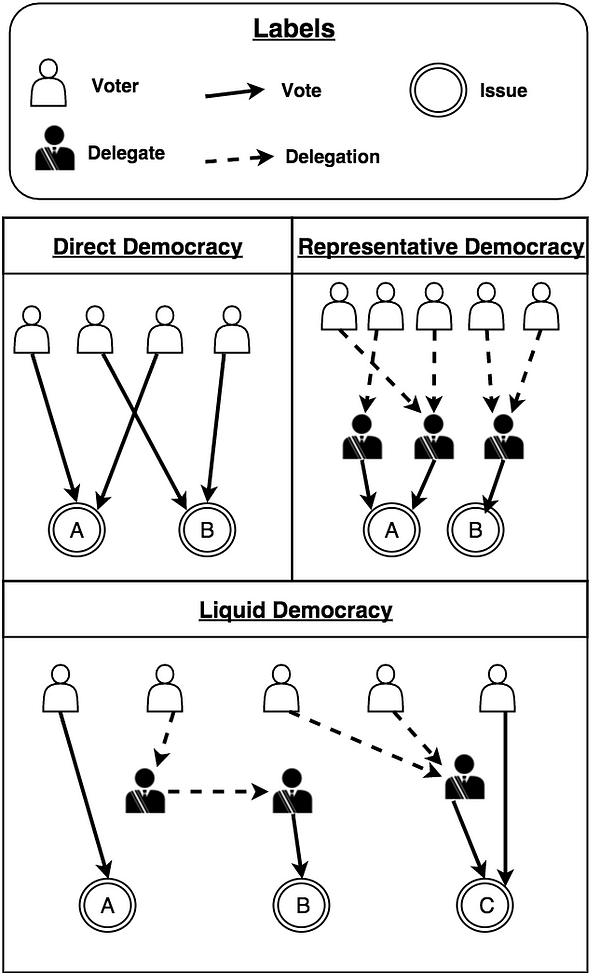
In the direct democracy model all voters vote directly on issues. In the representative democracy model voters first vote for and elect representatives who then vote on their behalf. The interesting take from the diagram is of course the Liquid Democracy model. Here voters can either vote directly on issues (like the two independent voters did on the left and right border), or they can delegate their vote to representatives who have more specialized knowledge about the issue, or simply more time to stay informed.
Delegation is a sign of trust. A voter trusts a delegate to represent her on certain decisions. If this trust is broken (by for example increasing ideological differences or corruption of the delegate), the voter can simply revoke the delegation and either vote personally, or delegate someone else. As we will see later, exactly this notion of provisional trust is important to create a sense of responsibility and accountability for delegates.
A very important property of Liquid Democracy is transitivity. Delegation can not only happen through single hop, but it is completely transitive. This means that delegates can even delegate other delegates to vote on their behalf and all the previous voters (who themselves have delegated their vote) linked in the chain. This transitivity ensures that experts can delegate the trust they’ve accumulated to other delegates on certain issues on which they have less knowledge and insight about.
The distinctive factor of Liquid Democracy vs. Delegative Democracy is that ofvote recommendation, instead of vote proxying (thanks to Josef Davies-Coates for pointing that out). As Sayke has pointed out in the original paperon Liquid Democracy, “People need to see what answers are being recommended to them before they decide how to answer the question at hand. With vote proxying, they can’t do that! Vote proxying puts the power in the hands of the proxy — answer recommendation keeps the power in the hands of the people”.
What is missing from the above diagram is domain-specific delegation. A voter cannot only delegate her vote to a single delegate, but delegation can be made to a variety of different delegates that vote on behalf of the voter on domain-specific issues. Through such a system, it is more likely that experts can positively influence the outcome of problems and lead to an overall better result.
The categorization of issues is up to the entire community to decide, but a very simple categorization for decisions inside a government could be: Fiscal Policy, Monetary Policy, Environment and Climate Policy.
To provide you with another example, let’s take a political party that is using liquid democracy for its internal decision making. The categories that would make a lot of sense for such a community would be: Finances, Marketing & Outreach, Political Program and Administrative decisions. Decisions that needs to be made will be categorized into these 4 categories. Members of the political party can then either vote directly on these decisions, or they can delegate their voting power on people with more specialized knowledge that is required to form an educated opinion.
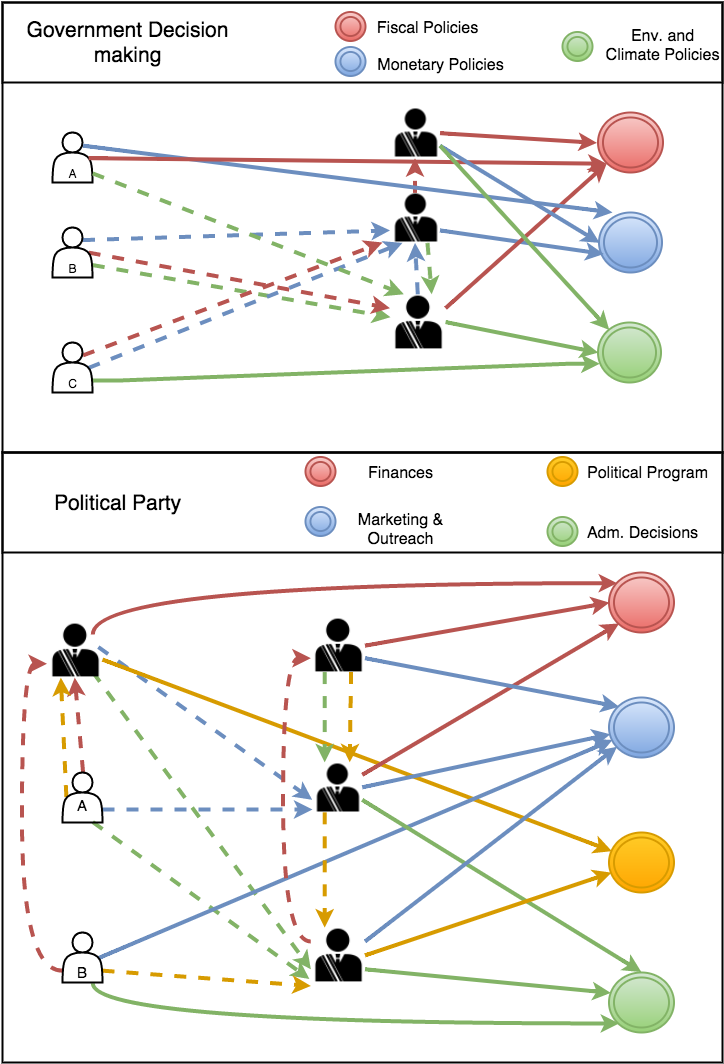
Let me explain the diagram in more detail, it might seem a bit confusing at first sight. Let’s explain the Government related diagram, the political party diagram is very similar. In total there are 6 voters, 3 of whom who have taken on the responsibility of being a delegate. As mentioned before, there are 3 types of issues (and thus, 3 areas of domain expertise): Fiscal Policies, Monetary Policies and Environment & Climate Policies.
As you can see, nearly each of the 6 voters has delegated their vote in one way or another, except for the top delegate, who voted independently on all issues (must be a true expert). Voter B has delegated every vote, either she is too busy, disinterested or does not have enough knowledge about the specific topics.
Overall, Liquid Democracy is only slightly more complex than direct or representative democracy. But the advantages it offers far outweigh this initial learning barrier. Let’s get into details about the advantages.
Liquid Democracy: Why?
Now that we have a better understanding about the problems of democracy today, and have a good overview of how Liquid Democracy works, we can get into details about the big “Why?”. Most importantly, we need to provide a solid case as to why Liquid Democracy is a much greater solution than the status quo. I hope that we will achieve this with a list of Liquid Democracy’s greatest features and advantages over direct and representative democracy.
Liquid Democracy is truly democratic. Voters have the choice to either vote personally or delegate someone else. This is in stark contrast to the democracies in use today, where users are limited to either constantly vote for themselves, or vote for a representative once every few years. In these two models, voters are either overwhelmed with the kind of work that is required to participate, or they are completely underwhelmed and not included enough in the government’s decision making. Liquid Democracy gives voters the freedom to decide their level of involvement, while being able to change it at any time. This means that the decision making of a country is directly in the hands of the entire population.
Liquid Democracy has a low entry barrier. The minimum requirement for becoming a delegate is another person’s trust. Nearly anyone, willing to take on this responsibility, can become a delegate. No political parties are required to win over voters. Instead of outrageous marketing campaigns where voters are purposefully deceived, only a person’s ability and knowledge about a subject counts in winning over delegates. By making the entry barrier as low as possible the overall decision-making process, which includes collection of ideas, comment and debate, will be much more vivid and filled with a diversity of ideas and point of views. Through that, the outcome of decisions will much more likely satisfy a large portion of the population and lead to an overall better governance of the country.
Liquid Democracy is cooperation, instead of competition. In representative democracies today the competition during the political race is dominated by lavish and unnecessary campaign spending, attempts at exposing political competitors and purposeful lies to win over voters. Often times, many candidates put more effort in crafting political campaigns to win the competition, instead of actually focusing on the supposed political program and the “how?”’s of leading a country. If making sure that voters vote for you is more important than the actual governance of the country, we can be assured that there is an inherent systemic flaw. Win all and become elected, or lose everything. That is the motto of democracy today. In Liquid Democracy this competition of becoming a representative is set aside. Instead, delegates merely compete on the basis of earning voters trust, which can only be achieved through continuous efforts and proof of one’s abilities. Voters cannot be deceived (at least not in the long run) and a person’s merit, willingness and ability to improve the country mean everything.
Liquid Democracy creates responsibility. Delegation is a sign of trust. If this trust is broken, a voter is able to immediately find another delegate or vote for herself. This provisional trust creates a sense of responsibility and accountability for delegates, because they could lose their delegated voting power at any time. Through this, delegates are more likely to act honest and are willing to vote in favor of the community instead of their own selfish desires.
Liquid Democracy means direct representation of minorities. By having a low entry barrier, minorities have it much easier to be represented in the government. This means that no extra laws, that require a minimum of representatives to come from a certain ethnicity or race, have to be implemented. Instead, Liquid Democracy is a direct representation of the society’s structure and makes it possible for minorities and ethnic groups of any size to have a say in the decision making and governance of the country.
Liquid Democracy leads to better decisions. By evolving into a network of experts that make well-informed, domain-specific decisions, Liquid Democracy leads to overall better decisions. Liquid Democracy eventually evolves into a meritocracy where the most skilled, knowledgeable and experienced voters make decisions in their area of expertise.
Liquid Democracy is scalable. In today’s time, people are far too busy to stay constantly updated on issues concerning the governance of the state. Decisions that need to be made are ever-increasing, while time is a precious good that many simply don’t want to spend on decision-making for the government. Additionally, we are a society of specialization, and very few are well-informed in different domains. Therefore, through delegation, decision-making is placed in the hands of well-informed experts who are willing to dedicate their time and knowledge to better the overall governance of the state.
The State of Liquid Democracy Today
The main reason why Liquid Democracy has not been used in practice until the last decade is because of the implementation barriers. Liquid democracies, same as direct democracies, require an underlying technical infrastructure that makes it possible for participants to constantly cast or delegate votes. Only through the Internet and advances in cryptography has this been possible during the last few decades.
Apart from the technical barriers, a much larger barrier today is the educational one. As this survey has shown:http://publicvotes.org/vote/ec94wL7Sw37iZtRwf only a small number of people have even heard of Liquid Democracy. Therefore, to really implement Liquid Democracy in large communities, a lot more effort needs to be placed on educating citizens about the advantages and the new democratic possibilities offered. The only real solution for that is to create interesting use case that display to people inside and outside the community what Liquid Democracy really means and the advantages it offers.
A great effort is being done by Pirate Parties across Europe which are using software like LiquidFeedback (http://liquidfeedback.org/) for certain decisions and even elections. Apart from this, Google has recently published(http://www.tdcommons.org/cgi/viewcontent.cgi?article=1092&context=dpubs_series) their results of an internal experiment with Liquid Democracy. We will see a lot more developments in this area and I think that Liquid Democracy will progress well with new initiatives that take place. Bryan Ford (http://www.brynosaurus.com/deleg/) has published a lot of fantastic work about Liquid Democracy and I encourage you all to check it out.
I will personally work on an implementation of Liquid Democracy on Ethereum and also collaborate with a few existing voting solutions to create new use cases.
Conclusion
Liquid Democracy is the democracy model fit for today’s society. The technology is ready, the only thing missing is more effort into working on concrete implementations that research this area in more detail. Most importantly, we need to determine which models are applicable for the actual governance (directive or administrative) of a country.
I am confident that over the coming years many of the questions that I and others have will be answered. Who knows, perhaps we will see a small city, or even just a village, adopt Liquid Democracy in a decade or two? That is certainly possible.

